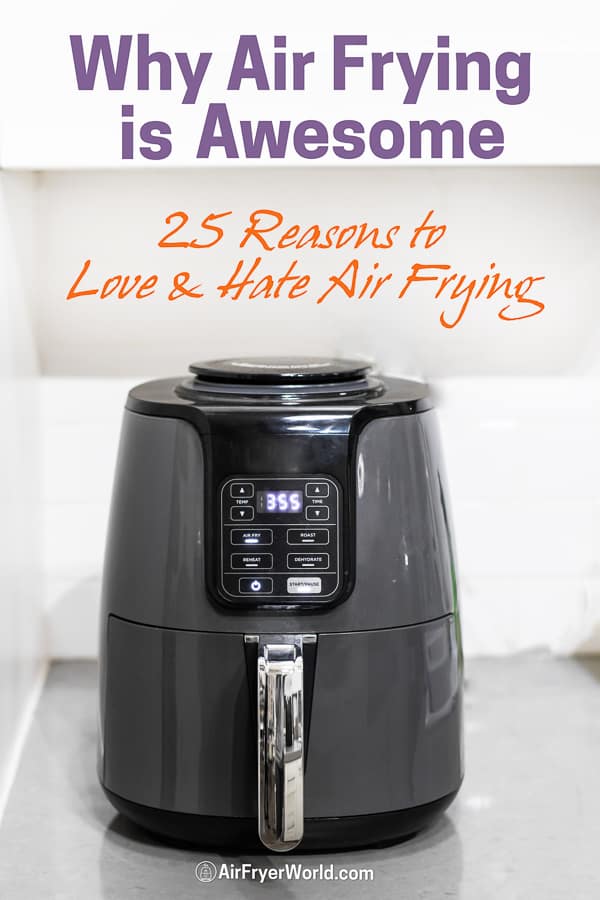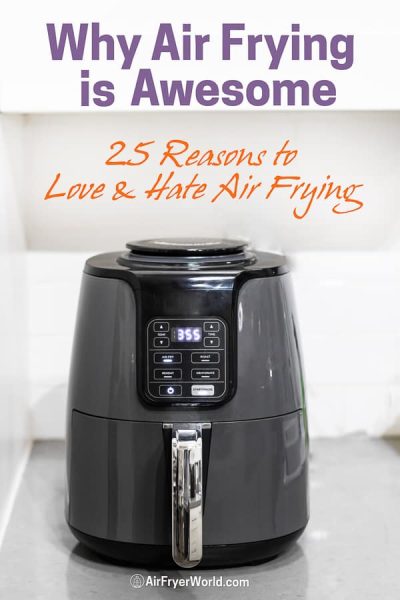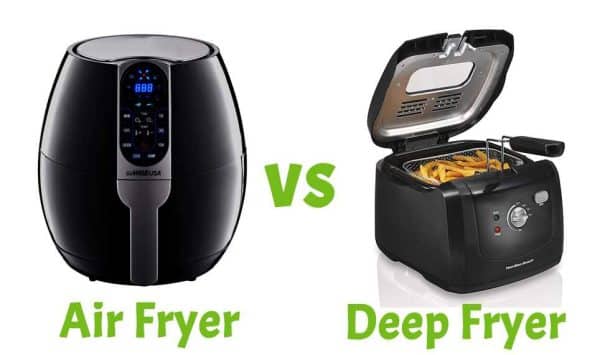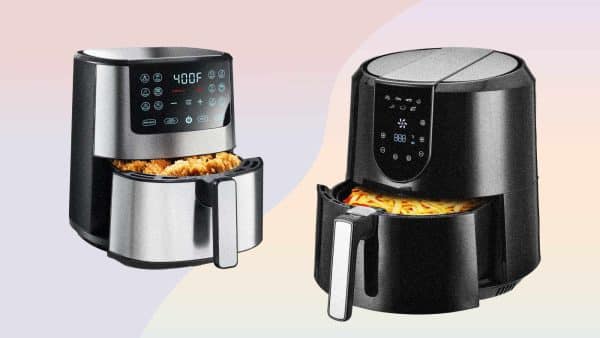Air fryers have become increasingly popular in recent years, promising a healthier alternative to deep frying with the same delicious taste.
However, despite their growing popularity, a surprising number of people don’t seem to like air fryers.
Whether it’s the lack of a crunch, the limited capacity, or the overall quality of the food, these dissenting opinions shed light on the reasons behind the skepticism towards this trendy kitchen appliance.
Let’s explore why some people don’t have the same enthusiasm for air fryers as others.
Taste and Texture
Different Taste
Some people don’t like air fryers because the food cooked in them often has a different taste compared to traditional frying methods.
While air fryers are advertised as being able to produce crispy and golden food, the results can often be lacking.
This is particularly true for foods that are deep-fried, such as french fries and chicken wings. The texture and taste of these foods in an air fryer are often not as satisfying as when deep-fried in oil.
Lack of Authenticity
Another issue with air fryers is the lack of authenticity in certain dishes. Foods traditionally prepared by frying, such as tempura or pakoras, may not come out the same way in an air fryer.
The coating may not achieve the same level of crispiness, or the overall taste may differ. This can be unpleasant for individuals seeking an authentic experience and taste when cooking these dishes.
Inconsistent Results
In addition to the different tastes and lack of authenticity, air fryers can also have inconsistent results. This is particularly evident when cooking large amounts of food or multiple batches.
The hot air circulation may not distribute evenly, resulting in some portions of the food being overcooked while others are undercooked. This can be frustrating for individuals who are looking for consistently well-cooked meals.
Dryness
One common complaint about air fryers is that they can dry certain foods. This is especially true for foods with a high water content, such as vegetables or specific cuts of meat.
The hot air circulation in the fryer can cause the moisture to evaporate quickly, leaving the food dry and less enjoyable to eat. This can be a turn-off for individuals who prefer their food to have a certain level of juiciness and tenderness.
Expense and Space
High Initial Cost
One of the reasons why people may be hesitant to invest in an air fryer is the high initial cost. Air fryers can range in price from around $50 to over $300, depending on the brand and features.
This can be a significant investment for individuals on a tight budget or who don’t see themselves using the air fryer frequently enough to justify the expense.
Additional Costs
In addition to the air fryer’s initial cost, additional costs may be associated with using it. Some air fryers require specific types of oil or cooking sprays, which can add to the overall expense. Additionally, if the air fryer comes with accessories or replacement parts, these may need to be purchased separately if not included in the initial purchase.
Limited Kitchen Space
Another factor to consider is how much kitchen space an air fryer takes up. While different sizes of air fryers are available, they still require a designated space on the countertop or in a cupboard. For individuals who have limited kitchen space, this may be a concern. It’s essential to assess whether the benefits of having an air fryer outweigh the potential loss of valuable kitchen real estate.
Complexity and Learning Curve
Confusing Controls
Some individuals may find air fryers to be complex and have a steep learning curve. The controls and settings on an air fryer can vary depending on the brand and model, making it difficult for first-time users to navigaters.
Understanding how to set the temperature and cooking time and choosing the appropriate settings can be confusing and may require referring to the instruction manual or online resources.
Requires Preheating
Another aspect of complexity with air fryers is the requirement for preheating. Unlike traditional frying methods, where you can heat the oil and start cooking, air fryers typically need to preheat before you can begin cooking. This additional step can be a hassle, especially if you want a quick and convenient cooking method.
Time and Temperature Calculations
Using an air fryer effectively also requires understanding time and temperature calculations. The cooking time and temperature settings may vary depending on the recipe and the type of food being cooked.
It can take some trial and error to determine the optimal settings for different foods, which can be time-consuming and frustrating for individuals who want a straightforward cooking experience.
Experimentation Needed
Successfully using an air fryer often involves a certain level of experimentation. Not all recipes and foods traditionally relying on frying will work well in an air fryer.
Finding the correct cooking times and techniques to achieve the desired results may take trial and error. For individuals who prefer a more intuitive and predictable cooking experience, the experimentation required for air frying may be off-putting.
Health Concerns
Not a Miracle Health Solution
While air frying is often touted as a healthier alternative to deep-frying, it is essential to note that it is not a miracle health solution. While it is true that air frying reduces the amount of oil used in cooking, it does not eliminate oil.
Foods cooked in an air fryer still require oil or cooking spray to achieve the desired texture and taste. Additionally, the food’s overall nutritional content remains the same.
Potential Formation of Harmful Compounds
There has been some concern about the potential formation of harmful compounds when using air fryers at high temperatures. When cooking certain foods, such as potatoes or breaded items, in an air fryer, there is a risk of acrylamide formation.
Acrylamide is a chemical compound that can form when starchy foods are cooked at high temperatures. It has been associated with an increased risk of cancer in animal studies, although more research is needed to understand the impact on human health fully.
Oil and Fat Dependency
While air frying uses less oil than deep-frying, it still relies on oil to achieve the desired texture and taste.
This can concern individuals watching their fat intake or trying to reduce their overall calorie consumption. It’s essential to remember that the crispy texture achieved in an air fryer is often a result of the oil coating on the food, which adds fat and calories.
Risk of Overeating
Another health concern with air fryers is the potential for overeating. The crispy and tasty results of air frying can be tempting, leading individuals to consume more significant portions or indulge in fried foods more frequently.
This can contribute to overeating and may hurt overall health and weight management. Practicing portion control and moderation is essential when using an air fryer.
Limits on Cooking Capacity
Small Food Capacity
One limitation of air fryers is their relatively small food capacity. The size of the cooking basket in an air fryer can vary, but it is generally smaller than the capacity of a deep fryer or even a regular oven.
This can be a drawback for individuals who must cook large amounts of food simultaneously, such as for a family dinner or a gathering. It may require multiple batches or extend the cooking time, which can be inconvenient.
Inconvenient for Larger Families or Gatherings
Regarding the tiny food capacity, air fryers may not be the most convenient option for larger families or gatherings.
Cooking multiple batches can take time and effort, and coordinating the timing of the different batches can be challenging. This can result in a longer overall cooking time and may make it difficult to simultaneously serve everyone hot and freshly cooked food.
Cleaning Challenges
Food Splatters
One of the challenges of using an air fryer is dealing with food splatters. The hot air circulation inside the fryer can cause food particles to splatter and adhere to the heating element or the walls of the fryer.
This can make cleaning more complex, as it may require more than just a simple wipe-down. Regular cleaning and maintenance are necessary to keep the air fryer in good condition and prevent the accumulation of food residue.
Difficult-to-Clean Parts
Air fryers often have several parts that need to be cleaned, such as the cooking basket, drip tray, and heating element.
Depending on the model, these parts can be difficult to clean thoroughly, especially if they have small crevices or are not dishwasher-safe. This can be a hassle for individuals who prefer easy and quick clean-up after cooking.
Higher Maintenance
In addition to the cleaning challenges, air fryers may also require regular maintenance to ensure optimal performance.
Some models recommend periodically removing and cleaning the heating element to remove any built-up residue. This additional maintenance can be time-consuming and may not be worth it for individuals looking for a low-maintenance cooking appliance.
Inefficient for Certain Foods
Battered or Wet Foods
Air fryers are not well-suited for cooking battered or wet foods. The hot air circulation in the fryer can cause the batter or coating to blow off or become unevenly distributed, resulting in less desirable results. This can be problematic for individuals who enjoy fried foods traditionally coated in batter or bread crumbs.
Delicate Foods
Similarly, delicate foods may not fare well in an air fryer. Items such as fish fillets or thinly sliced vegetables can be too delicate to withstand the forceful hot air circulation. They may become overcooked or break apart during cooking, leading to unappetizing or unevenly cooked results.
Certain Sauces or Marinades
Air fryers may not be the best option for foods that require certain sauces or marinades. The fryer’s high heat and circulating air can cause sauces and marinades to evaporate quickly or burn, resulting in a less flavorful end product.
It may be more challenging to achieve the desired flavor profile when using an air fryer than other cooking methods that allow longer simmering or marinating times.
Environmental Impact
Energy Consumption
Air fryers require electricity, and their energy consumption can increase over time. While they may be more energy-efficient than conventional ovens, they still contribute to overall energy usage.
This can concern individuals who are conscious of their environmental footprint or are looking for ways to reduce their energy consumption.
Non-Biodegradable Components
Another environmental consideration is the presence of non-biodegradable components in some air fryers. Specific models may have non-stick coatings or parts made from materials that are not easily recyclable or biodegradable.
This can contribute to waste generation and may concern individuals prioritizing sustainability and environmentally-friendly products.
Unsuitable for Some Dietary Preferences
Limited Options for Vegetarians or Vegans
Air frying is often associated with fried meats like chicken wings or bacon. This can be a limiting factor for individuals who follow vegetarian or vegan diets.
While it is possible to air fry plant-based foods, such as vegetables or tofu, the range of options may be narrower compared to a traditional frying method. This can be frustrating for individuals who want a versatile cooking appliance that accommodates their dietary preferences.
Incompatible with Certain Diets
Additionally, air frying may not be compatible with specific diets or eating plans. Some diets, such as raw food or specific macro-based diets, may not allow for cooked foods or specific cooking techniques like frying.
It’s essential to consider your specific dietary needs and restrictions before investing in an air fryer to ensure that it aligns with your eating habits and goals.
Perception and Marketing
Misleading Claims
One aspect that may contribute to people’s dislike of air fryers is the presence of misleading claims in marketing materials. Air fryers are often advertised as a healthier alternative to deep-frying, claiming to use up to 80% less oil.
While it is true that air frying uses less oil than deep-frying, the reduction in oil may not be as significant as advertised. This can lead to disappointment and disapproval when individuals realize that the health benefits may not be as substantial as initially believed.
Hype and Expectations
Air fryers have gained a lot of hype and popularity in recent years, with many individuals praising them as revolutionary cooking appliances.
While they offer certain advantages, the high expectations and hype may lead to disappointment for some people. It’s essential to approach air frying with realistic expectations and understand that it may not be a one-size-fits-all solution for every cooking need.
Product Reputation
Finally, the reputation of specific air fryer brands or models can also impact people’s perception and dislike of these appliances. Like any other product, not all air fryers are created equal in quality and performance.
Negative experiences with a particular brand or model can sour someone’s perception of air fryers. It’s essential to do thorough research and read reviews before purchasing to ensure that the chosen air fryer meets your expectations and needs.
While air fryers have certainly gained popularity and appeal for their promise of healthier frying, it is essential to consider why some individuals may not like them.
From concerns about taste and texture to issues of expense and cleaning challenges, there are legitimate factors to weigh before deciding if an air fryer is the proper cooking appliance for you.
By understanding the limitations and considering your specific needs and preferences, you can make an informed decision and determine whether an air fryer will be a valuable addition to your kitchen.
Ninja AF101 Air Fryer that Crisps, Roasts, Reheats, & Dehydrates, for Quick, Easy Meals, 4 Quart Capacity, & High Gloss Finish, Grey
$79.99 in stock
2 used from $44.95
COSORI Air Fryer Pro LE 5-Qt, for Quick and Easy Meals, UP to 450℉, Quiet Operation, 85% Oil less, 130+ Exclusive Recipes, 9 Customizable Functions in 1, Compact, Dishwasher Safe, Gray
$79.99 in stock
Ultrean Air Fryer 6 Quart, Large Family Size Electric Hot Airfryer XL Oven Oilless Cooker with 7 Presets, LCD Digital Touch Screen and Nonstick Detachable Basket,UL Certified,1700W (white)
Ninja AF080 Mini Air Fryer, 2 Quarts Capacity, Compact, Nonstick, with Quick Set Timer, Grey
Chefman Small Compact Air Fryer Healthy Cooking, 2 Qt Nonstick, User Friendly and Adjustable Temperature Control w/ 60 Minute Timer & Auto Shutoff, Dishwasher Safe Basket, BPA-Free, 2 Quart, Black
Elite Gourmet EAF2612D Personal 2.1Qt Compact Space Saving Programmable Hot Air Fryer, Oil-Less Healthy Cooker, Timer & Temperature Controls, 1000W, Black
$34.99 in stock















































